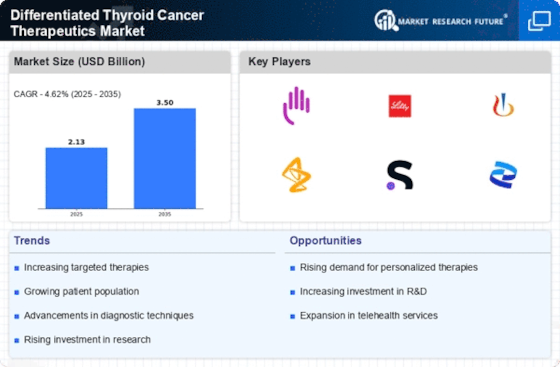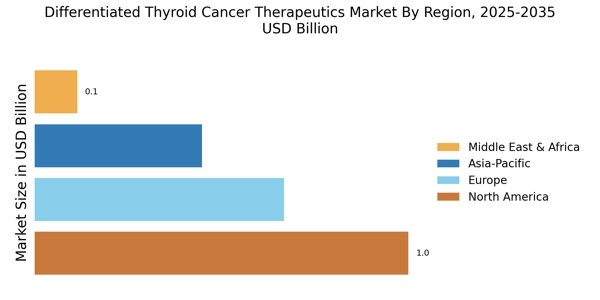Increased Research Funding
The surge in research funding dedicated to thyroid cancer is a crucial driver for the Differentiated Thyroid Cancer Therapeutics Market. Governments and private organizations are increasingly recognizing the need for innovative treatment solutions, leading to substantial financial support for clinical trials and research initiatives. In recent years, funding for thyroid cancer research has seen a notable increase, with allocations reaching over USD 200 million annually in various regions. This influx of capital enables researchers to explore novel therapeutic approaches, enhancing the development pipeline and ultimately benefiting patients. As a result, the market is likely to experience growth as new therapies emerge from these funded projects.
Advancements in Treatment Modalities
Innovations in treatment modalities are significantly influencing the Differentiated Thyroid Cancer Therapeutics Market. The advent of targeted therapies and novel drug formulations has transformed the therapeutic landscape, offering patients more effective and less invasive options. For instance, the introduction of tyrosine kinase inhibitors has shown promising results in managing advanced cases. Market data suggests that the global market for targeted therapies is projected to reach USD 3 billion by 2026, reflecting a compound annual growth rate of approximately 8%. These advancements not only improve patient outcomes but also attract investment from pharmaceutical companies eager to capitalize on emerging technologies, thereby driving market expansion.
Regulatory Support for New Therapies
Regulatory support for the approval of new therapies is a vital driver for the Differentiated Thyroid Cancer Therapeutics Market. Regulatory agencies are increasingly streamlining the approval process for innovative treatments, recognizing the urgent need for effective options in managing differentiated thyroid cancer. Recent initiatives have led to expedited review pathways for promising therapies, significantly reducing the time from development to market. This regulatory environment encourages pharmaceutical companies to invest in research and development, as the likelihood of successful product launches increases. Consequently, this supportive framework not only accelerates the introduction of new therapies but also enhances competition within the market, ultimately benefiting patients.
Growing Patient Awareness and Advocacy
The rise in patient awareness and advocacy for differentiated thyroid cancer is significantly impacting the Differentiated Thyroid Cancer Therapeutics Market. Increased educational efforts and support groups have empowered patients to seek timely diagnosis and treatment options. This heightened awareness is reflected in the growing number of online resources and community initiatives aimed at educating the public about thyroid cancer. As patients become more informed, they are more likely to engage with healthcare providers regarding available therapies, thereby driving demand for innovative treatment options. This trend not only fosters a more proactive patient population but also encourages pharmaceutical companies to develop and market new therapeutics tailored to patient needs.
Rising Incidence of Differentiated Thyroid Cancer
The increasing incidence of differentiated thyroid cancer is a primary driver for the Differentiated Thyroid Cancer Therapeutics Market. Recent statistics indicate that thyroid cancer cases have been on the rise, with an estimated annual increase of 3% in many regions. This trend is likely attributed to factors such as enhanced diagnostic techniques and greater awareness among healthcare professionals and patients. As more individuals are diagnosed, the demand for effective therapeutic options escalates, prompting pharmaceutical companies to invest in research and development. Consequently, this surge in incidence not only highlights the need for innovative treatments but also stimulates market growth, as stakeholders seek to address the growing patient population.

















